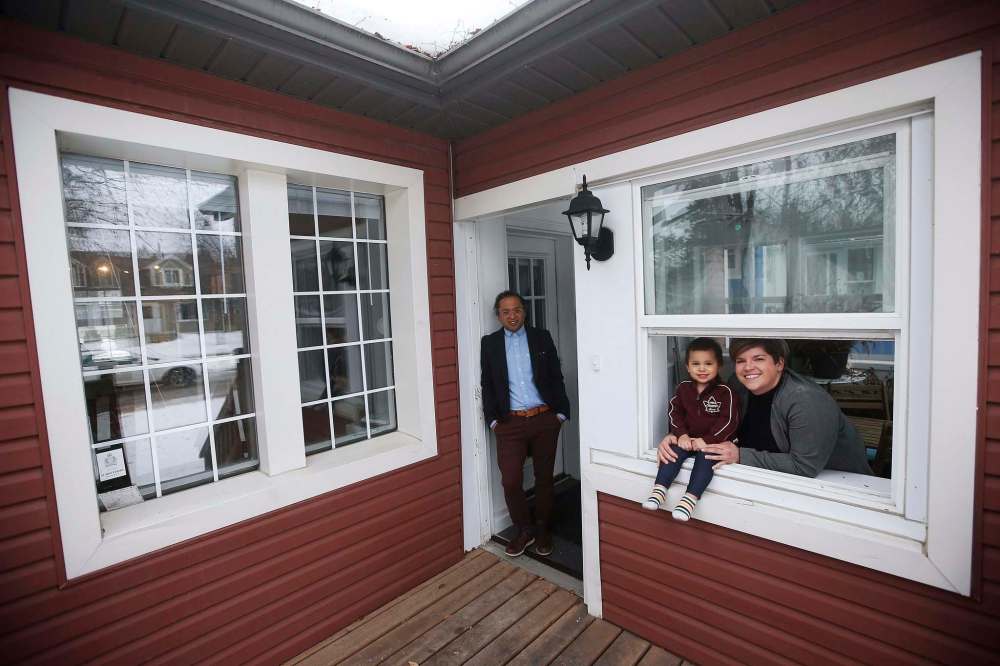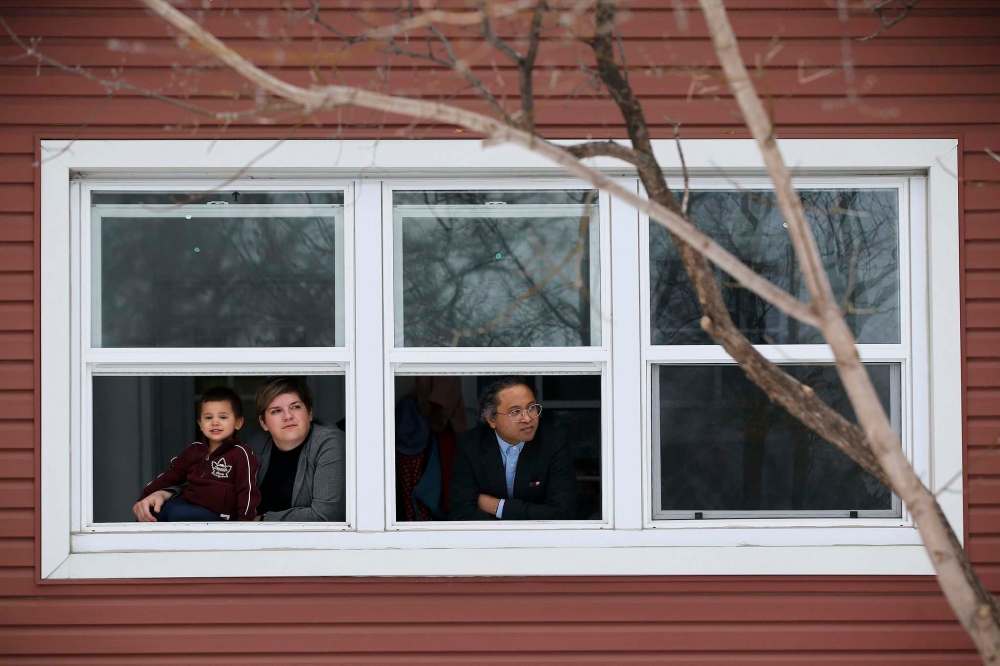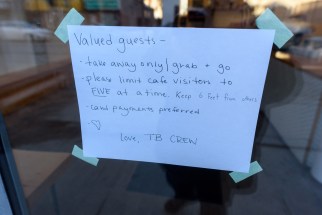Dealing with disquiet Registered therapists offer free counselling over the phone to help with isolation during pandemic
Read this article for free:
or
Already have an account? Log in here »
To continue reading, please subscribe:
Monthly Digital Subscription
$0 for the first 4 weeks*
- Enjoy unlimited reading on winnipegfreepress.com
- Read the E-Edition, our digital replica newspaper
- Access News Break, our award-winning app
- Play interactive puzzles
*No charge for 4 weeks then price increases to the regular rate of $19.00 plus GST every four weeks. Offer available to new and qualified returning subscribers only. Cancel any time.
Monthly Digital Subscription
$4.75/week*
- Enjoy unlimited reading on winnipegfreepress.com
- Read the E-Edition, our digital replica newspaper
- Access News Break, our award-winning app
- Play interactive puzzles
*Billed as $19 plus GST every four weeks. Cancel any time.
To continue reading, please subscribe:
Add Free Press access to your Brandon Sun subscription for only an additional
$1 for the first 4 weeks*
*Your next subscription payment will increase by $1.00 and you will be charged $16.99 plus GST for four weeks. After four weeks, your payment will increase to $23.99 plus GST every four weeks.
Read unlimited articles for free today:
or
Already have an account? Log in here »
Hey there, time traveller!
This article was published 25/03/2020 (2093 days ago), so information in it may no longer be current.
In the midst of the uncertainty and fear of a modern-day plague, Megan and Ben Capili aren’t lending helping hands, given the constraints on social contact.
They are, however, lending their ears and offering advice to people finding it challenging to manage the emotional and psychological impacts of the COVID-19 pandemic that looms over daily life.
The married couple are registered therapists, offering free phone counselling evenings and weekends through their private practice Liminal Space Therapy.
Need to talk to someone?
Liminal Space Therapy offers free, brief phone counselling from 5 p.m. to 7 p.m. weekdays, and anytime weekends. Call 204-799-3806 or 204-290-5165.
Sara Riel Inc.’s Seneca Services has a 24-hour peer-support line at 204-942-9276 or 204-231-0217.
The Anxiety Disorders Association of Manitoba has a support line from 9 a.m. to 9 p.m. weekdays and 10 a.m. to 4 p.m. weekends. Leave your name, phone number or email address and someone will contact you. You can also email adam@adam.mb.ca.
Klinic Community Health’s Crisis Line is open 24 hours at 204-786-8686 or 1-888-322-3019.
“Working in health care in the largest hospital in the province, there is a tension everywhere you go,” says Ben Capili, also a family therapist specializing in child and adolescent health at Health Sciences Centre. “Health-care workers are stressed; they don’t know what to expect.”
That got him thinking about how the public might feel, and that many may need someone to listen to their concerns and fears. More pointedly, many people may just need someone to connect with in this new world of imposed isolation.
“We wanted to do the right thing and show compassion,” he says about the decision to offer the free service.
Although social distancing and quarantines may be necessary to stem the spread of COVID-19, the increased isolation also increases the risk of developing mental-health problems, experts say.
“We know that social connection is one of the most important things for mental health,” says Marion Cooper, executive director of the Canadian Mental Health Association, Manitoba chapter.
“Probably above anything else, it’s our connections with one another that are our most protective.”
While everyone is at risk of increased mental-health challenges in the current context, many care providers are worried about people with existing mental illness.
“Everybody is an individual, so it’s hard to generalize, but we know there is increased vulnerability for an individual struggling with a mental illness,” Cooper says.

She further notes individuals with depression, anxiety, schizophrenia and other mental illnesses already may face social stigma that tends to make them feel isolated.
Now that social-distancing measures are often eliminating regular social connections, such as group therapy, this segment of the population may feel even more alone.
“I’m really worried about people,” says Tara Snider, executive director of Sara Riel Inc., which works with more than 600 clients with mental illness or addiction.
The organization has been racing to restructure services, moving one-on-one counselling and group therapy to online, virtual sessions. As well, the service has set up a 24-hour hotline for anyone feeling the need for psychological and emotional support.
“I’m afraid of people sitting at home without any interaction,” she says. “A symptom of mental illness is isolation; so much of what we do as an organization is visiting people.”
“I’m afraid of people sitting at home without any interaction. A symptom of mental illness is isolation; so much of what we do as an organization is visiting people.” – Tara Snider, executive director of Sara Riel Inc.
Social-distancing measures now make keeping vulnerable populations connected more challenging. Especially at risk are those surviving on Employment and Income Assistance, who often do not have a phone or internet connection to reach out for help.
“The way to get well is through connection with others, so when you’re isolated, your mental health has a very significant chance of deteriorating,” Snider says.
Yet it’s not just people with existing mental-health challenges at risk of feeling intense distress from the onslaught of frightening news and staying at home alone or with close family.
Megan Capili, who also works part time as a therapist at Riverview Health Centres neurology rehabilitation unit, notes many studies demonstrate the negative effects of loneliness and isolation. That includes research suggesting being alone for prolonged periods is equivalent to smoking 15 cigarettes a day.
“Isolation is linked to depression, poor sleep, cognitive decline and can even impair our immunity,” she says.

Like others in the mental-health field, she says individuals must be proactive in preparing for what could be months of social distancing and potentially weeks of being quarantined, or even a widespread lockdown.
One means to combat the impacts of being at home all the time is to create a new routine. Find activities, from spring cleaning to hobbies, to help fill the day. Practise self-care, she adds.
“It’s important to take part in soothing and pleasing activities.”
Going outside is also important. Cooper says social distancing does not mean entirely isolating yourself. You can still go for a walk and talk to your neighbours so long as you keep a two-metre distance.
“Unless you’ve been quarantined, there are ways to have social distance without being isolated.”
“Rather than having anxiety about what’s out of your control, just accept it. That’s called ‘radical acceptance,’ where we say, ‘OK, this is what’s happening, and I’m OK with it.’” – Megan Capili
Connecting virtually is also important. Snider says it’s somewhat ironic that social media — once considered a cause of social isolation — may now be a linchpin to stay connected.
“But that’s to a point,” she says. “This is also a time for people to actually hear a voice on the other end of the line.”
Snider urges us to think about the people in our lives who might be more isolated, including aging family members who are more likely to be homebound due to their higher risk of developing severe symptoms.
Although staying connected is vital, so too is keeping a positive headspace, Megan Capili says.
“Rather than having anxiety about what’s out of your control, just accept it,” she says. “That’s called ‘radical acceptance,’ where we say, ‘OK, this is what’s happening, and I’m OK with it.’”
Then act on what you can control, she says, taking constructive steps to improve life in ways you can.
Of course even being cooped up with family — while not lonely — has its challenges, too. Irritability, along with other negative emotions, is likely to come up more frequently as the days and weeks pass. As such, Capili suggests not focusing on suppressing these negative thoughts.
That doesn’t mean acting on them, she adds.
“Instead it’s like riding these emotions like a wave,” she says. “You’re surfing the feeling, so the wave comes and then sinks into the sand and quickly disappears.”
In other words, hold on and take a deep breath; those negative emotions will soon pass.
Just like the pandemic will eventually, too.






